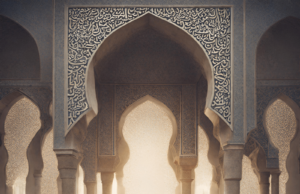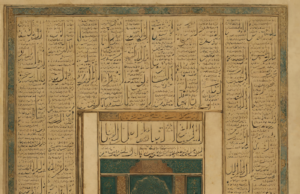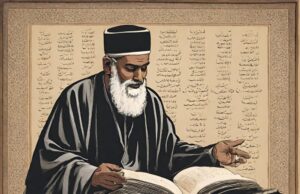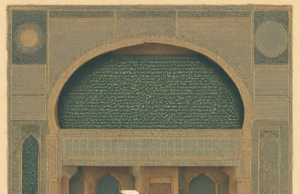But we don’t consider them Gods!
An argument made by the proponents of invocation or supplication to the Prophet ﷺ or the awliyā’ when answering those who contend that the...
Why is Dua to ‘Other than Allah’ forbidden across Ghayb (unseen)?
Download PDF
WHY IT IS CRUCIAL TO USE THIS PHRASE WHEN APPROACHING QUR’ĀNIC VERSES ABOUT DUʿĀ’ AND ISTIGHĀTHA.
The phrase ‘across the curtain of Ghayb (barrier...
How reliable is our Hadith Corpus? | Ayatullah Sayyid Kamal Al-Haydari
In a crucial video, Ayatullah Sayyid Kamāl al-Ḥaydarī sheds light on the challenges of the Twelver Imāmī Ḥadīth corpus. He cautions against accepting fabricated narrations that support exaggerated beliefs about Imams. Al-Ḥaydarī refutes claims that classical scholars effectively filtered out fabrications, suggesting instead that they exacerbated the issue. He emphasizes the use of the Qur’ān to discern authentic narrations, as advocated by the Imams.
How authentic is the Hadith of the Twelve Caliphs after the...
This paper delves into the famous ‘12 Caliph/Ruler’ Hadith cited in Sunni sources, often used to support the Twelver Imami belief regarding the Imamate lineage after Prophet Muhammad (s). Further, it critically evaluates Sunni Hadith scholarship’s view on its authenticity and explores Twelver Imami sources, arguing that the Hadith was never thought to refer to their Imams by the early Shia, primarily because of its text being tailored to prop up Umayyad legitimacy rather than that of the Ahlul Bayt (as).
Dua to other than Allah? Tawassul or Istighathah?
Exploring the practice of Dua to entities other than Allah, this article investigates concepts like Tawassul and Istighathah within Islamic theology. It delves into the theological debates surrounding these practices, examining their validity in light of clear-cut teachings of Quran and Ahl al-Bayt. Through critical analysis, it seeks to provide clarity on the permissibility and boundaries of such supplications, fostering a deeper understanding of Islamic beliefs and practices related to invoking divine assistance.
Did the Prophet (s) and the Aimmah (as) have knowledge of...
This post continues the theological exploration initiated in Part 1, probing into the extent of knowledge possessed by Prophet Muhammad and the Imams in Shia Islam. Building upon Quranic verses, Hadiths, and scholarly interpretations, it delves deeper into the nuances of 'ilm al-ghayb (knowledge of the unseen) and its implications. It prompts readers to reflect on the complexities of prophetic knowledge and its significance within Islamic belief, encouraging a nuanced understanding of the roles of the Prophet and the Imams in guiding the Muslim community.
Is Istighatha (invoking other than Allah) considered Shirk (Part 2)?
Part 2 delves deeper into scholarly perspectives and Quranic references, providing a comprehensive analysis of Istighatha within Islamic doctrine. Drawing upon Hadiths and classical jurisprudence, the article scrutinizes diverse viewpoints, aiming to elucidate the nuanced understanding of seeking help from entities other than Allah. It encourages readers to engage thoughtfully with the theological implications of invoking beings other than Allah.
Is Istighatha (invoking other than Allah) considered Shirk (Part 1)?
This post delves into the theological debate surrounding the concept of Istighatha in Islam, particularly regarding its potential classification as shirk (associating partners with Allah). It aims to provide clarity on this contentious issue, inviting readers to critically evaluate the theological implications of invoking beings other than Allah. By delineating the boundaries of permissible invocation within Islamic doctrine, the article encourages a deeper understanding of Tawhid (the oneness of Allah) and its implications for Muslim belief and practice.
Did the Prophet (s) and the Aimmah (as) have knowledge of...
Delving into the theological inquiry regarding the extent of knowledge possessed by Prophet Muhammad and the Imams in Shia Islam. Drawing upon Quranic verses, Hadiths, and scholarly interpretations, it explores the concept of 'ilm al-ghayb (knowledge of the unseen) and invites readers to ponder upon the nature of prophetic knowledge and its implications for understanding the role of the Prophet and the Imams within Islamic tradition. Part 1 initiates a broader discourse on the subject, paving the way for deeper exploration in subsequent installments.
What is Ghuluww (Exaggeration) in Religion?
Delving into the concept of Ghuluww, this article examines the thin line between religious fervor and extremism. Through historical and contemporary examples, it highlights the detrimental effects of exaggerated religious practices on communities. Advocating for moderation and tolerance, it encourages a balanced approach to faith. This insightful exploration urges readers to reflect on the importance of maintaining harmony and understanding within religious contexts.









